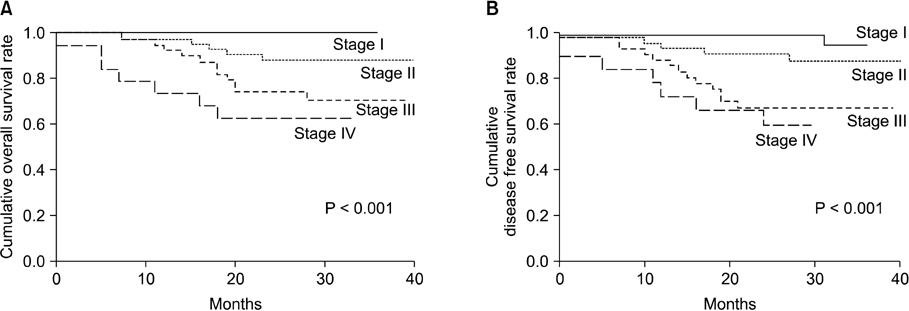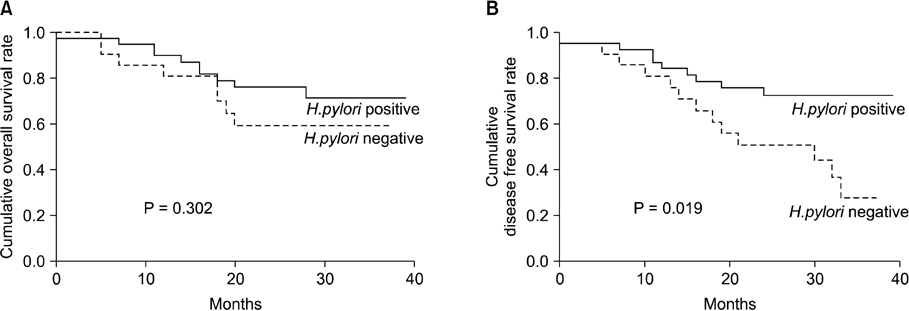J Korean Surg Soc.
2012 Oct;83(4):203-211. 10.4174/jkss.2012.83.4.203.
The Effects of Helicobacter pylori on the prognosis of patients with curatively resected gastric cancers in a population with high infection rate
- Affiliations
-
- 1Department of Surgery, Ajou University School of Medicine, Suwon, Korea. hansu@ajou.ac.kr
- 2Institute for Gastric Cancer Mechanism, Ajou University School of Medicine, Suwon, Korea.
- 3Department of Pathology, Ajou University School of Medicine, Suwon, Korea.
- 4Department of Laboratory Medicine, Ajou University School of Medicine, Suwon, Korea.
- KMID: 2212305
- DOI: http://doi.org/10.4174/jkss.2012.83.4.203
Abstract
- PURPOSE
The goal of this study was to assess the correlation between the Helicobacter pylori status of patients who underwent curative resection for gastric adenocarcinoma and their prognosis in Eastern societies where H. pylori infection is prevalent.
METHODS
Between 2006 and 2007, 192 patients who had a curative resection for the treatment of gastric adenocarcinoma were enrolled in the study. Of these patients, 18 were excluded due to an inexact evaluation of the H. pylori status, thereby leaving 174 patients in the final analysis. Serologic testing for H. pylori was assessed using an enzyme-linked immunosorbent assay kit for immunoglobulin G, and the histological presence of H. pylori was identified using the Giemsa stain.
RESULTS
Of the 174 patients, 111 patients (63.8%) were confirmed for H. pylori infection. H. pylori status did not correlate with the overall or disease-free survival. For patients with stage III or IV gastric cancer, a positive H. pylori status was a significant predictive factor for recurrence over that of a negative H. pylori status (P = 0.019). Negative H. pylori status was a predictive factor for recurrence in multivariable analysis (relative risk, 2.724; 95 confidence interval, 1.192 to 6.228).
CONCLUSION
Helicobacter pylori status did not correlate with the clinicopathologic factors of gastric adenocarcinoma. However, a negative Helicobacter pylori status may be a predictive factor for recurrence in patients diagnosed with advanced gastric adenocarcinoma.
Keyword
MeSH Terms
Figure
Reference
-
1. Choi Y, Gwack J, Kim Y, Bae J, Jun JK, Ko KP, et al. Long term trends and the future gastric cancer mortality in Korea: 1983-2013. Cancer Res Treat. 2006. 38:7–12.2. IARC Working Group on the Evaluation of Carcinogenic Risks to Humans. International Agency for Research on Cancer. World Health Organization. Schistosomes, liver flukes and Helicobacter pylori. 1994. Lyon: IARC.3. Take S, Mizuno M, Ishiki K, Nagahara Y, Yoshida T, Yokota K, et al. The effect of eradicating Helicobacter pylori on the development of gastric cancer in patients with peptic ulcer disease. Am J Gastroenterol. 2005. 100:1037–1042.4. Uemura N, Okamoto S, Yamamoto S, Matsumura N, Yamaguchi S, Yamakido M, et al. Helicobacter pylori infection and the development of gastric cancer. N Engl J Med. 2001. 345:784–789.5. Wong BC, Lam SK, Wong WM, Chen JS, Zheng TT, Feng RE, et al. Helicobacter pylori eradication to prevent gastric cancer in a high-risk region of China: a randomized controlled trial. JAMA. 2004. 291:187–194.6. Jeong O, Park YK. Clinicopathologic features and surgical treatment of gastric cancer in South Korea: The results of 2009 nationwide survey on surgically treated gastric cancer patients. J Gastric Cancer. 2011. 11:69–77.7. Marrelli D, Pedrazzani C, Berardi A, Corso G, Neri A, Garosi L, et al. Negative Helicobacter pylori status is associated with poor prognosis in patients with gastric cancer. Cancer. 2009. 115:2071–2080.8. Meimarakis G, Winter H, Assmann I, Kopp R, Lehn N, Kist M, et al. Helicobacter pylori as a prognostic indicator after curative resection of gastric carcinoma: a prospective study. Lancet Oncol. 2006. 7:211–222.9. Lu H, Graham DY, Yamaoka Y. The Helicobacter pylori restriction endonuclease-replacing gene, hrgA, and clinical outcome: comparison of East Asia and Western countries. Dig Dis Sci. 2004. 49:1551–1555.10. Kim SY, Ahn JS, Ha YJ, Doh HJ, Jang MH, Chung SI, et al. Serodiagnosis of Helicobacter pylori infection in Korean patients using enzyme-linked immunosorbent assay. J Immunoassay. 1998. 19:251–270.11. Japanese Gastric Cancer Association. Japanese classification of gastric carcinoma. Gastric Cancer. 1998. 1:2nd english edition. 10–24.12. Baba H, Korenaga D, Okamura T, Saito A, Sugimachi K. Prognostic factors in gastric cancer with serosal invasion. Univariate and multivariate analyses. Arch Surg. 1989. 124:1061–1064.13. Maruyama K, Gunven P, Okabayashi K, Sasako M, Kinoshita T. Lymph node metastases of gastric cancer: general pattern in 1931 patients. Ann Surg. 1989. 210:596–602.14. Pinto-de-Sousa J, David L, Almeida R, Leitao D, Preto JR, Seixas M, et al. c-erb B-2 expression is associated with tumor location and venous invasion and influences survival of patients with gastric carcinoma. Int J Surg Pathol. 2002. 10:247–256.15. von Rahden BH, Stein HJ, Feith M, Becker K, Siewert JR. Lymphatic vessel invasion as a prognostic factor in patients with primary resected adenocarcinomas of the esophagogastric junction. J Clin Oncol. 2005. 23:874–879.16. Yonemura Y, Endo Y, Fujita H, Fushida S, Ninomiya I, Bandou E, et al. Role of vascular endothelial growth factor C expression in the development of lymph node metastasis in gastric cancer. Clin Cancer Res. 1999. 5:1823–1829.17. Yonemura Y, Ninomiya I, Yamaguchi A, Fushida S, Kimura H, Ohoyama S, et al. Evaluation of immunoreactivity for erbB-2 protein as a marker of poor short term prognosis in gastric cancer. Cancer Res. 1991. 51:1034–1038.18. Hundahl SA, Phillips JL, Menck HR. The National Cancer Data Base Report on poor survival of U.S. gastric carcinoma patients treated with gastrectomy: fifth edition American Joint Committee on Cancer staging, proximal disease, and the "different disease" hypothesis. Cancer. 2000. 88:921–932.19. Strong VE, Song KY, Park CH, Jacks LM, Gonen M, Shah M, et al. Comparison of gastric cancer survival following R0 resection in the United States and Korea using an internationally validated nomogram. Ann Surg. 2010. 251:640–646.20. Bonenkamp JJ, Hermans J, Sasako M, van de Velde CJ, Welvaart K, Songun I, et al. Extended lymph-node dissection for gastric cancer. N Engl J Med. 1999. 340:908–914.21. Cuschieri A, Weeden S, Fielding J, Bancewicz J, Craven J, Joypaul V, et al. Surgical Co-operative Group. Patient survival after D1 and D2 resections for gastric cancer: long-term results of the MRC randomized surgical trial. Br J Cancer. 1999. 79:1522–1530.22. Sano T. Tailoring treatments for curable gastric cancer. Br J Surg. 2007. 94:263–264.23. Leung WK, Kim JJ, Kim JG, Graham DY, Sepulveda AR. Microsatellite instability in gastric intestinal metaplasia in patients with and without gastric cancer. Am J Pathol. 2000. 156:537–543.24. Wu MS, Lee CW, Shun CT, Wang HP, Lee WJ, Sheu JC, et al. Clinicopathological significance of altered loci of replication error and microsatellite instability-associated mutations in gastric cancer. Cancer Res. 1998. 58:1494–1497.25. Wu MS, Lee CW, Sheu JC, Shun CT, Wang HP, Hong RL, et al. Alterations of BAT-26 identify a subset of gastric cancer with distinct clinicopathologic features and better postoperative prognosis. Hepatogastroenterology. 2002. 49:285–289.26. Bamford KB, Fan X, Crowe SE, Leary JF, Gourley WK, Luthra GK, et al. Lymphocytes in the human gastric mucosa during Helicobacter pylori have a T helper cell 1 phenotype. Gastroenterology. 1998. 114:482–492.27. Mattsson A, Lonroth H, Quiding-Jarbrink M, Svennerholm AM. Induction of B cell responses in the stomach of Helicobacter pylori-infected subjects after oral cholera vaccination. J Clin Invest. 1998. 102:51–56.28. Hobsley M, Tovey FI, Holton J. Helicobacter pylori and gastric cancer: neither friend nor foe. Gastroenterology. 2007. 132:2076.29. Cutler AF, Prasad VM. Long-term follow-up of Helicobacter pylori serology after successful eradication. Am J Gastroenterol. 1996. 91:85–88.30. Wang WM, Chen CY, Jan CM, Chen LT, Perng DS, Lin SR, et al. Long-term follow-up and serological study after triple therapy of Helicobacter pylori-associated duodenal ulcer. Am J Gastroenterol. 1994. 89:1793–1796.
- Full Text Links
- Actions
-
Cited
- CITED
-
- Close
- Share
- Similar articles
-
- Helicobacter pylori-negative Gastric Cancer
- Two Cases of Gastric Stump Cancer: Possible Role of Helicobacter pylori Infection
- Helicobacter pylori-negative Gastric Mucosa-associated Lymphoid Tissue Lymphoma
- Helicobacter pylori and Expression of p53 Protein in Gastric Cancer
- The Rate of Infection by Helicobacter Pylori in Gastric Cancer Patients




